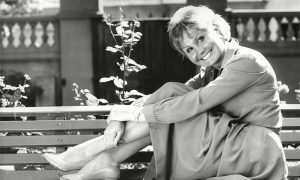Maverick writer David Mercer’s first play for the strand departs from much of his previous work, and in the process goes further down the road of experimentation than just about any previous television drama. Told in a series of skits, visual gags, dream sequences and bits of stock footage, with an arch linking voice-over, halfway between a Man Alive commentary and Lewis Carroll’s narrative voice in Alice in Wonderland, the play tells of the fight between cantankerous, aging aristocrat Lord Fountain (Patrick Troughton) and his illegitimate twin sons, the skinny Timothy (David Markham) and corpulent Bernard (Willoughby Goddard).
Being illegitimate, via Fountain’s cockney servant Maggie (Diana Coupland), the twins serve no purpose to Fountain for furthering his dynasty, and, on Maggie’s departure to live with brash, didactic artist Towser Griddle, who takes to keeping her in a cage while he paints her, Fountain tries various ways of sending the hapless pair off into obscurity. A stint at Oxford, where they prove less than successful with the girls via an alienating lack of small talk, is followed by a period in the army during WWII, which they spend in the Burmese jungle, befriending the local wildlife, and a lost Japanese soldier, Ishaki, who plays the flute while they sing twee and forlorn Carollian nonsense songs.
On return, the boys take jobs as junior zookeepers and hook up with two working class girls, Poppy and Laura, though the latter fell increasingly frustrated by the brothers’ emotionally retarded whimsical conversation and lack of sexual potency (as the recently-certified-virile Lord Fountain frustratedly bounds from one barren wife to the next). Lord F’s involvement in a dog food company leads the brothers, in a state of panic, to unlock the zoo’s cages, leaving gorillas and wombats to charge about the Home Counties. Their borderline schizophrenic condition is not helped by any of this (Timothy: ‘Every morning when I open my eyes, I feel as if I’ve just arrived […] and everything’s new and mysterious. At one time it was very serious. I had to go round at bedtime putting cards on things with their names on. Chair, bed, lamp, Bernard. Bernard looked quite odd with a card pinned to his pyjamas with “Bernard” written on it.’)
Poppy and Laura connive with lord Fountain to sue the brothers for breach of promise, an act which sends Bernard into a porpoise-filled coma. Ever more egocentric, Lord F dreams a conversation with God, who unsurprisingly backs him all the way (Lord F: ‘You’ll forgive me if I grin.’ God: ‘Why not? It’s your dream.’) The brothers move into their new womblike sanctuary – a condemned swimming baths which they decorate with candles and inflatable animals, and swing from two trapezes while singing nonsense to each other. Poppy and Laura turn up to voice their disgust at this further dereliction of duty (‘You’ve had all the advantages. You should be helping to run the country.’)
A game of Russian roulette goes nowhere (‘Did you put the bullet in?’ ‘No […] it makes me too nervous.’) Finally, at a dinner party thrown by Lord F in ‘honour’ of his sons, set somewhere in limbo and with all the play’s characters, including Ishaki, attending, the pair are humiliatingly denounced by all in turn, before receiving a gift of a female mannequin each, and exiting dolefully to derisive laughter. Their swimming pool sanctuary destroyed by Fountain to make way for a supermarket, the boys flee, and are last seen in the company of Ishaki, piloting a canoe up the Amazon jungle.
Even from this outline the manic scope and absurdity of the play is obvious, but there’s a lot more here than bizarre satire at the expense of a crumbling post-war social order. After the brothers purchase their swimming pool, the pace and tone shift from quickfire farce to a more introspective, melancholy style, which mainly springs from the childlike questioning moroseness of the brothers themselves – a hauntingly real-sounding voice of madness in amongst the intentionally cut-out appearance of the play’s world. While it’s pointless to speculate on the mental make-up of the fictional twins (a doctor cautions Timothy: ‘Look old man, don’t let’s go careering down one of those Freudian side-tracks, eh?’) there is much here that tallies with Mercer’s fascination with schizophrenia, and their alienation from society, combined with their proto-hippie love of animals and desire to just ‘be’, makes a canny, and not overstated, link between the fragmentation of the boys’ egos and that of post-war society in general.
It’s perhaps fitting, then, that the play meanders to a close, but this is the nature of practically all of Mercer’s work from 1962 (when he wrote the groundbreaking A Suitable Case for Treatment) onwards. From then on, he claimed he never planned a play before he began writing, and so in the process it took him in directions as surprising to him as to the first-time viewer. A brave and foolish strategy – some times – as here and in his fine Robert Kelvin plays (see below) he gets away with it in style; at others (the fragmented Play for Today The Bankrupt) he loses his way utterly and no amount of melodrama can bring him back.
Here, though, Mercer is triumphant, as is director Don Taylor, managing his way through uncharted directorial territory with aplomb, coping with an ambitious and expensive shoot (the swimming pool scenes took two weeks after hours in bent ford Baths, with the crew working flat-out overnight in electrically-hazardous conditions) and handling the disparate elements (filmed scenes, silent inserts, limbo vignettes and stock footage) with obvious relish, taking care to steer the play away from the, as he put it, ‘twee’ abyss it constantly teeters over. Predating the anarchic cut-up comedy of Monty Python et al, while giving vent to a truly affecting voice of inner sadness that hasn’t surfaced in quite this way since, rarely was television drama to get this ahead of the game as Mercer did here.



















